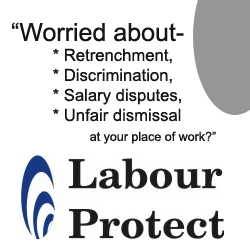


Tel: 0860 522687/0860 LABOUR


Thank you
Labour Protect more
Labour Protect more
Unfair Labour Practice
What constitutes an Unfair Labour Practice?
It is unfair treatment by an employer of an employee or job applicant. There are a limited number of unfair labour practices that
the LRA defines, the types of treatment, which may constitute an
unfair labour practice, are discussed hereunder. Section 185 of the
LRA states that every employee has the right not to be subjected to
an unfair labour practice.
The meaning of Unfair Labour Practice
An unfair labour practice means any unfair act or omission that
arises between an employer and an employee, involving:
The unfair conduct of the employer relating to the promotion,
demotion or training of an employee or relating to the provision
of benefits to an employee,
The unfair suspension of an employee or any other disciplinary
action short of dismissal in respect of an employee,
The failure or refusal of an employer to reinstate or re-employ a
former employee in terms of any agreement,
An occupational detriment, other than dismissal, in contravention of the Protected Disclosures Act, 2000, on account of an employee having made a protected disclosure as defined in that Act.
Unfair conduct relating to Promotion, Demotion, Training or Benefits
This usually involves cases where the employer deviates from its
own promotion or training policy or where the employee alleges that the promotion, demotion or training is in itself unfair. If it is alleged that the failure to promote is a result of discrimination, this dispute must be referred to the Employment Equity Commission as such a dispute (see information sheet: Discrimination). If all employees pass a test and all except one or a few are promoted, the employer may be guilty of unfair conduct against that / those employees.
An example of unfair conduct based on benefits would be when all
employees are given transport allowances, but one is discriminated against and not given this allowance. This may constitute an unfair labour practice. An example of unfair conduct relating to training would be if all employees were given training but for one or two, for no apparent /fair reason (i.e. that they already have the skills); this may constitute an unfair labour practice.
Unfair Sanction or Disciplinary Action
Usually an employee would refer a dispute relating to the unfairness of disciplinary measures taken, based on the merits of their innocence in the alleged wrongdoing.
Suspension as a disciplinary sanction is the only instance where
suspension can be unpaid. Whilst on suspension pending a
disciplinary enquiry, an employee must be paid. Non-payment must be referred to the Department of Labour as a non-payment of salary dispute. It is not regarded as an unfair labour practice dispute as this definition relates only to benefits and not salary.
A dispute regarding the unfair suspension may be referred as an
unfair labour practice if the employee is on suspension for an
unreasonably long period and where there is no plausible reason for the delay in finalising the enquiry. An example of unfair suspension would be where an employee and her supervisor argue and the employer suspends only the employee, even though it was the supervisor who was to blame.
Refusal by an employer to reinstate former employee in terms of any agreement
This type of unfair labour practice requires an agreement to havebeen in existence (verbal, written, individual or collective). Usually
these disputes arise in retrenchments situations. If there is no
agreement, then the dispute may be referred as an unfair dismissal based on operational requirements. An example will be when there was an agreement between the employer and a retrenched employee to the effect that the employee will be re-employed when a vacancy becomes available and the employer does not re-employ that employee, the conduct on the part of the employer may constitute an unfair labour practice.
Unfair treatment creating an occupational detriment for an employee who made a protected disclosure
If an employee makes a protected disclosure as set out in that Acte.g. makes a disclosure regarding the conduct of an employer as
he/she has reason to believe that the information shows that the
employer is committing a criminal offence, and is thereafter
prejudiced for making such disclosure by being demoted, such
conduct of the employer would constitute an unfair labour practice.
Dispute about unfair treatment
All the disputes about forms of unfair treatment may be referred
firstly to conciliation conducted either by a bargaining council, and if
there is no council, by the CCMA. If the dispute remains unresolved, it can be referred to arbitration.
When to refer an Unfair Labour Practice dispute
Section 191 states that the employee has 90 days from the date of
the act or omission which allegedly constitutes an unfair labour
practice or, if it is a later date, within 90 days of the date which the
employee became aware of the act occurrence.
Relevant legislation: Labour Relations Act, section 185; 186
Employment Equity Act
Unfair discrimination: is dealt with under the Employment Equity Act.
FOR MORE INFORMATION CONTACT THE CCMA OPERATIONS & INFORMATION DEPARTMENT ON (011) 377-6650 OR YOUR NEAREST CCMA OFFICE



